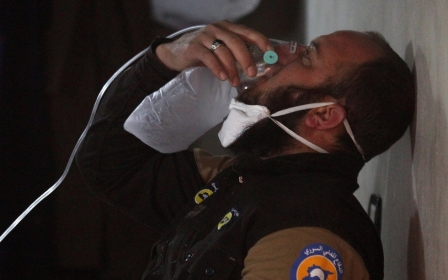Iran blames Syrian 'terrorists' for Idlib chemical attack
Iran has suggested that Syrian rebels may be responsible for a chemical gas attack Tuesday that killed at least 72 civilians including 20 children in Idlib, Syria.
A foreign ministry spokesperson condemned ‘all use of chemical weapons’ in Syria but then suggested the blame may lie more with ‘terrorist groups’ than President Bashar al-Assad.
"Iran strongly condemns all use of chemical weapons regardless of who is responsible and who are the victims," said foreign ministry spokesman Bahram Ghassemi to Tasnim News Agency.
Iran strongly condemns all use of chemical weapons regardless of who is responsible and who are the victims
- Iranian foreign ministry
As governments across the world line up to condemn Asad and Russia for the attack, the spokesperson said it was necessary to avoid "rushed judgments and accusations that benefit... certain actors".
But Ghassemi emphasised that "terrorist groups" have been known to transfer, store and use chemical weapons in Syria.
"Ignoring the need for the chemical disarmament of armed terrorist groups has harmed the process of chemically disarming Syria (as a whole) and the Islamic republic of Iran has raised its concerns about this on several occasions," he said.
"We are ready to bring the victims to Iran and help them,” Ghassemi added.
Iran has been one of Assad's key backers in the six-year conflict, and refer to all rebel groups in the country as "terrorists".
This is not first time Iran has accused Syrian rebels of carrying out chemical attacks.
In the wake of the August 2013 Ghouta attack, Iranian Foreign Minister Mohammad Javad Zarif claimed that the Syrian government assured Iran that it did not use "such inhumane weapons".
He said "the international community must show a serious reaction to the use of chemical weapons by the terrorists in Syria and condemn this move."
Iran's president, Hassan Rouhani, added that Iran, itself a victim of chemical attacks in its 1980-1988 war with Iraq, "totally and vigorously condemned the use of chemical weapons".
Last year a report by the London-based IHS conflict monitor said that the Islamic State group had used chemical weapons, including mustard gas and chlorine at least 52 times in Syria and Iraq.
Iran’s comments underscore its unswerving support for Bashar al-Assad’s regime during a six-year long civil war.
Iran is estimated to be spending $6bn a year on the Assad regime, according to sources close to Staffan de Mistura, the UN special envoy for Syria.
The war has also claimed the lives of more than 700 Iranian troops, many of whom are from the country’s elite Revolutionary Guards.
Stay informed with MEE's newsletters
Sign up to get the latest alerts, insights and analysis, starting with Turkey Unpacked
Middle East Eye delivers independent and unrivalled coverage and analysis of the Middle East, North Africa and beyond. To learn more about republishing this content and the associated fees, please fill out this form. More about MEE can be found here.




